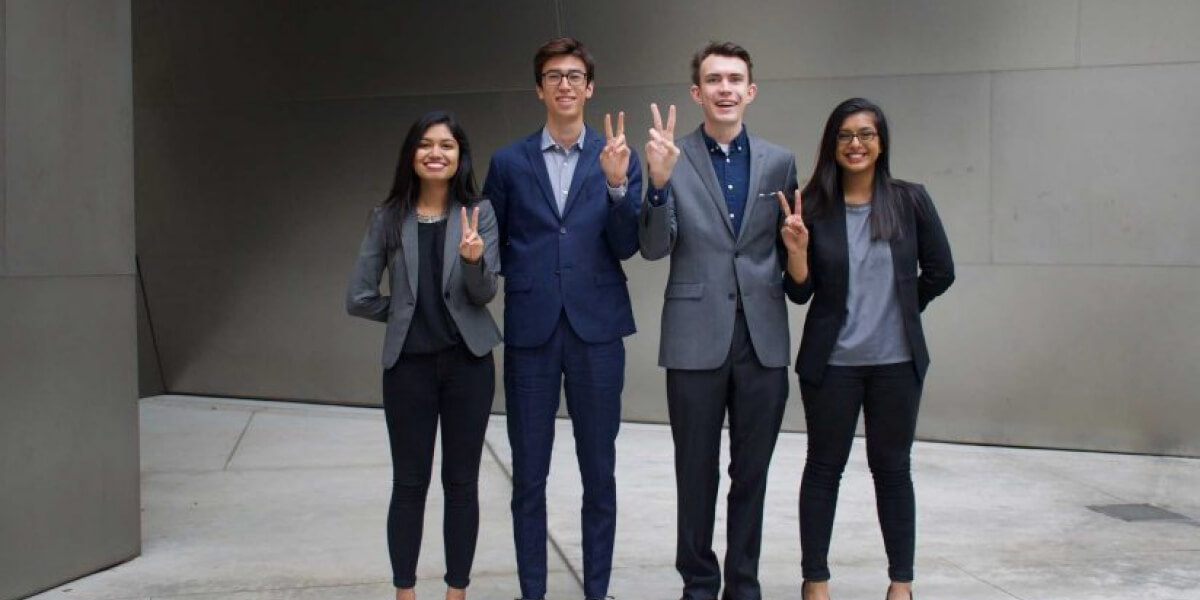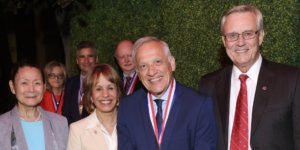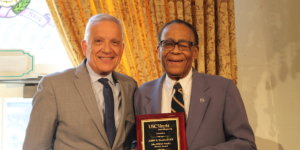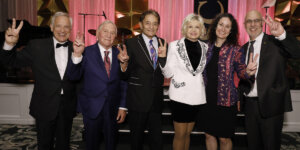
INTRAM team members Manjima Sarkar, David Sealand, Adam Walker and Rhea Choudhury, from left (Photo/Rhea Choudhury)
For the past eight years, the USC Viterbi School of Engineering has played an important role in supporting the National Academy of Engineering’s Grand Challenges.
As INTRAM, a USC Viterbi student-led startup making an app to improve post-stroke care, prepares to represent the U.S. this week at National Academy of Engineering’s Global Grand Challenge business model competition, it is worth noting the integral role USC Viterbi has played in advancing the Grand Challenges.
In a 2008 study commissioned by the National Science Foundation, the NAE identified 14 new Grand Challenges for Engineering, including engineering better medicines, advancing personal learning and making solar energy economical.
In the words of USC Viterbi Dean Yannis C. Yortsos, “the Grand Challenges set a grander scope for our discipline by changing the conversation about engineering, by providing key aspirational goals and by inspiring the new generations about the importance of engineering as the enabling discipline of our times.”
In 2009, inspired by the NAE’s bold call to engineers to solve some of society’s most pressing challenges, USC Viterbi joined forces with Duke University and Olin College in launching the first-ever Grand Challenges national summit. The following year, USC hosted a second national NAE Grand Challenges conference on campus.
The national summits were expanded into global summits, where NAE partnered with the Royal Academy of Engineering and the Chinese Academy of Engineering. USC Viterbi played an important role in helping launch the first-ever Global Grand Challenges Summit in London in March 2013. Two years later, in 2015, USC Viterbi helped organize the second Global Grand Challenges Summit in Beijing, and specifically the Student Day and Business Model competition. This year, Dean Yortsos was part of the Steering Committee that helped put together the 2017 Global Grand Challenges Summit, which takes place July 18-20 in Washington D.C. And along with Vice Dean Andrea Belz, he helped organize this year’s edition of the Student Day and Business Model competition.”
“We treasure our partnership with the NAE,” Yortsos said. “We look forward to engaging all our friends to promote the engineering discipline as the quintessential discipline of our times: one that solves problems and creates amazing new opportunities.”
At the 2015 global NAE summit in China, Yortsos helped organize the first-ever International Student Day Business Model Competition.
At that event, USC’s Stasis Labs, which builds health-monitoring technologies for developing countries to track heart rates, blood oxygen levels and other functions, came in second place out of the 15 participating teams. INTRAM will try to maintain USC Viterbi’s hot streak at this week’s 2017 Global Grand Challenge Summit in Washington D.C.
“The Grand Challenges, and any grand challenges of the future, will be solved by the next generation,” Yortsos said.
USC Viterbi’s role in the global business model competition goes beyond the dean’s role in its founding.
This year’s 15 global finalists were mentored in a program developed by Andrea Belz, USC Viterbi vice dean for technology, innovation and entrepreneurship and director of the Innovation Node–Los Angeles, with curriculum based on the National Science Foundation Innovation Corps (“I-Corps”) Program. The global course brought together engineering students across the U.S., United Kingdom and China for six sessions to learn about customer discovery, business models and invention with impact.
An important outcome of the first national summit was the NAE Grand Challenge Scholars Program developed by the three founding members, Duke University, Olin College and USC. This program has now expanded to more than 50 universities nationwide and it is growing internationally. It is a program that encourages the development of a growth mindset among undergraduate engineering students, namely one that focuses on competencies such as entrepreneurship and innovation, interdisciplinary collaboration and research, cultural awareness and societal consciousness.
The seeds that planted then are bearing fruit today.
In March 2015, President Barack Obama was presented with a letter of commitment, signed by 122 universities and colleges, pledging to educate a new generation of engineers in the Grand Challenges, with a goal of 20,000 students in the next decade.
“We are thrilled from the support of the White House for this initiative which is nurturing and developing the next generation of game changers in engineering” Yortsos said.
Published on July 19th, 2017
Last updated on September 11th, 2017










